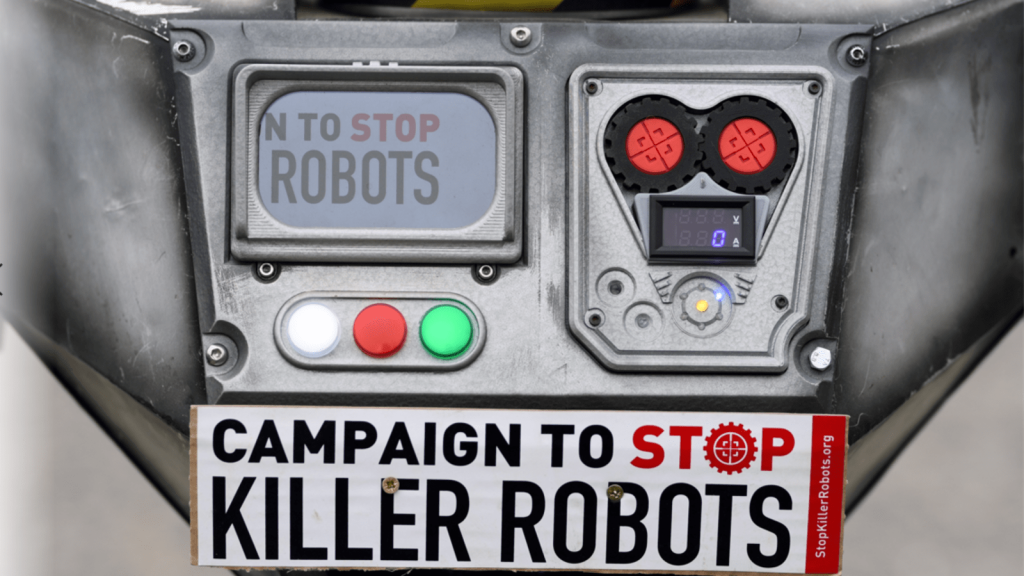Autonomous Weapons: An Exploration into the Ethical Implications and Policy Challenges

“The Ethics of Autonomous Weapons: Policy and Governance Challenges”
Welcome to a deep dive into the world of autonomous weapons. These types of weapons, fed by artificial intelligence (AI), have severed the direct line of control traditionally held by human operators. As we explore the ethical challenges of autonomous weapons, we’ll examine questions of legal and moral responsibility, the protection of human rights, and the policies that govern these systems.
An Introduction to the Ethics of Autonomous Weapons
Navigating the Morality of Robotic Warfare
Autonomous weapons systems, or so-called “killer robots”, represent a paradigm shift in warfare. These systems, driven by advancements in machine learning and autonomous weapon systems (AWS) technologies, can function without meaningful human control—a significant departure from traditional weapons systems.
Despite the potential to provide unprecedented strategic advantages in the battlefield, autonomous weapons are also the subject of fierce ethical, policy, and legal debates. The deployment of these weapons raises pressing questions regarding the adequacy of existing international laws, the potential violation of human rights, their impact on the global arms race, and the potential for accidental escalation of armed conflicts.
Understanding Ethical Frameworks for AI in Defence
###The Debate Over Autonomous Weapons: A Critical Review
The field of artificial intelligence (AI) has greatly advanced in the last decades, and with it, the capabilities of autonomous weapon systems. This evolution has disrupted the balance of lethal autonomous weapons systems (LAWS) and weapons systems policies.
Current international laws dictate that meaningful human control must be maintained over the use of lethal force. However, the emergence of LAWS has put the question of meaningful human control to the test. In the United States, for instance, the Department of Defense issued Directive 3000.09, which requires appropriate levels of human judgment over the use of force.
Human rights organizations such as Human Rights Watch have been campaigning against LAWS, arguing that they are fundamentally incompatible with human dignity. These critics argue that the lack of human control could lead to a violation of international humanitarian law (IHL) and human rights.
Positions of National Governments on Autonomous Weapons
Evaluating the Policies and Governance of Autonomous Weapon Systems
Yet, despite these concerns, the development and use of autonomous weapons systems continue to advance, reflecting differing national security interests and ethical perspectives. Notably, the United States Department of Defense has committed to the careful regulation and control of LAWS deployment, emphasizing the design and deployment of LAWS in accordance with IHL.
In contrast, across the Atlantic, there is growing concern over the proliferation of lethal autonomous weapons systems. The United Nations in New York has been leading discussions on creating a legally binding instrument to ban LAWS under international law.

The Relevance of Soft Law in Regulating Autonomous Weapon Systems
The Impact of Autonomous Weapons on Warfare and Military Strategies
The autonomous weapon revolution is reshaping warfare and military strategies globally. Yet, the discussion around autonomous weapons systems laws, autonomy in weapons, and autonomy in weapons systems remains heated.
Despite these disputes, existing soft law instruments like codes of conduct, principles, and guidelines can form the basis for regulation. The practicality of soft law lies in its adaptability: unlike hard law, it can respond quickly to technological advances.
Moreover, given the ethical dimensions involved, university press publications examining this topic are numerous and seek to elaborate on the discussions surrounding the frameworks and mechanisms for regulating LAWS.
Conclusions and Recommendations: Solving Ethical Challenges of Autonomous Weapons
Exploring The Intersection of Ethics, Law, and Autonomous Weapons
Autonomous weapons systems are poised to play an increasingly prominent role in the future of warfare. Concurrently, there’s a compelling need to establish regulations to govern the development and use of these systems. It’s clear that an ethical framework for autonomous weapons —rooted in existing international humanitarian law and committed to protecting human rights— could serve as a foundation for policy.
The urgent need for international consensus on the human control over autonomous weapons systems laws is also evident. As initial steps, a useful start could be the requirements for transparency in the development and use of these weapons systems, ensuring meaningful human control and compliance with IHL, and a commitment to human dignity above strategic advantages.
In conclusion, autonomous weapons systems reflect a new era of warfare. Navigating the ethical challenges and policy implications of these systems will require concerted global effort, commitment, and agility. These advances force us to redefine our notions of control, responsibility, and warfare itself. Only through sustained, rigorous, and ethical scrutiny can we hope to guide the evolution of autonomous weapon systems in a direction that upholds our shared values and principles.

Leave a Reply